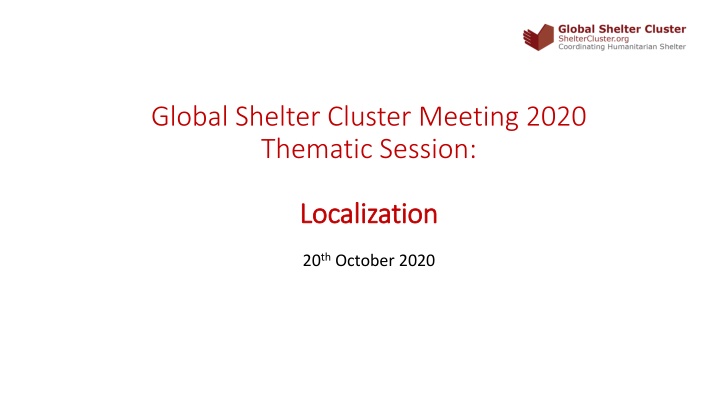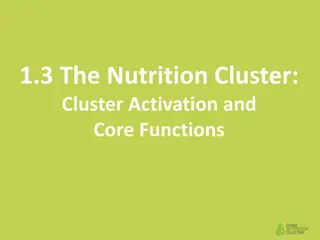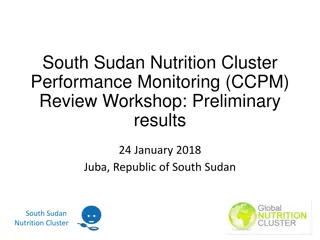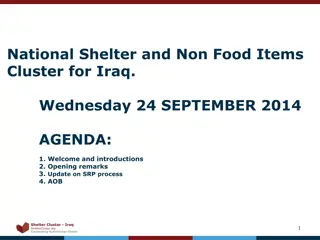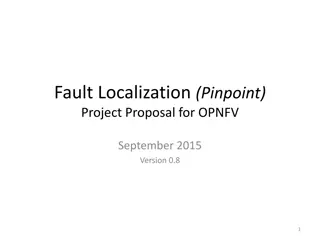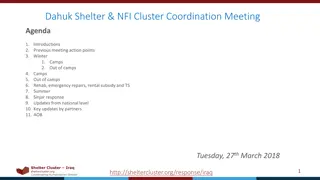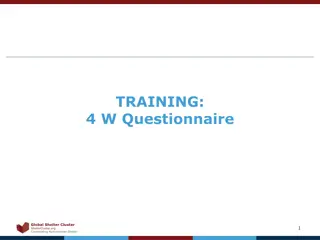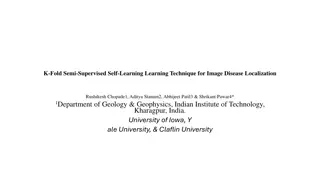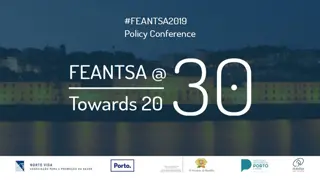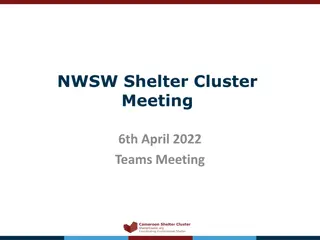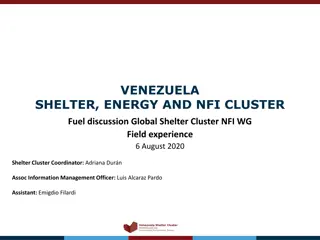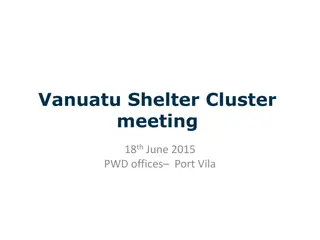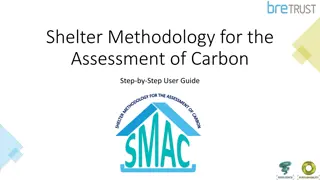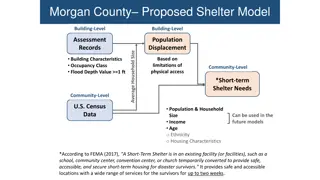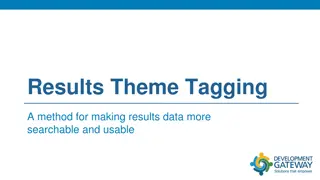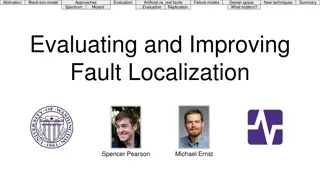Global Shelter Cluster Meeting 2020 Thematic Session: Localization Overview
The Global Shelter Cluster Meeting 2020 Thematic Session on Localization delves into the scope, limitations, and agenda of localization in humanitarian response. It includes insights from consultations with cluster coordinators and partners in 16 countries, focusing on defining local actors, coordination mechanisms, and practical lessons for individual clusters.
Download Presentation

Please find below an Image/Link to download the presentation.
The content on the website is provided AS IS for your information and personal use only. It may not be sold, licensed, or shared on other websites without obtaining consent from the author.If you encounter any issues during the download, it is possible that the publisher has removed the file from their server.
You are allowed to download the files provided on this website for personal or commercial use, subject to the condition that they are used lawfully. All files are the property of their respective owners.
The content on the website is provided AS IS for your information and personal use only. It may not be sold, licensed, or shared on other websites without obtaining consent from the author.
E N D
Presentation Transcript
Global Shelter Cluster Meeting 2020 Thematic Session: Localization Localization 20th October 2020
Session Overview Session Overview Background to Consultancy Scope and Limitations Definition of Localization and Local Actors Coordination Mechanisms and Localization Five Dimensions of Localization Survey and Consultation Findings Lessons for individual Clusters Questions
Background Background Consultation with Shelter Cluster Coordinators and a survey of Cluster partners in 16 countries: Afghanistan, Cameroon, Chad, Democratic Republic of Congo, Iraq, Mali, Nigeria, Myanmar, Somalia, Syria, Sudan, Turkey, Ukraine, Venezuela and Yemen. Advise country-level clusters on the development of a plan of action based on the findings of the results of the localization survey
Scope and Limitations Scope and Limitations Relatively short time frame 23 days spread over 2 months Constraints on cluster colleagues available time to engage Individual clusters were also dealing with spikes in need Some Clusters only recently activated Degree of detail of surveys balanced with likely response Not possible to reach local actors that sit outside of the cluster
The Localization Agenda The Localization Agenda a recap! a recap! No single definition of localisation . Grand Bargain signatories committed to making principled humanitarian action as local as possible and as international as necessary while continuing to recognize the vital role of international actors in particular in situations of armed conflict. According to the IFRC, localising humanitarian response is a process of recognising, respecting and strengthening leadership by local authorities and the capacity of local civil society in humanitarian action to better address the needs of affected populations.
What Constitutes a Local Actor? What Constitutes a Local Actor? According to the IASC definition, a local or a national actor are of two types and can be determined as follows; Local and national non-state actors are Organizations engaged in relief that are headquartered and operating in their own aid recipient country and which are not affiliated to an international NGO . Note; A local actor is not considered to be affiliated merely because it is part of a network, confederation or alliance wherein it maintains independent fundraising and governance systems . National and sub-national state actors are State authorities of the affected aid recipient country engaged in relief, whether at local or national level .
Coordination Mechanisms and Localization Coordination Mechanisms and Localization Global/country coordination Clusters work with hundreds of local government and civil society actors and can draw on these networks to improve analysis and coordination, document and disseminate lessons learned and encourage good practices to be taken to scale. Coordination Clusters lead the development of national humanitarian response strategies; and they help government, donors and pooled fund managers decide when and where to invest advocacy, funding and other resources. The coordination system has both an obligation to promote localisation and an opportunity to support agencies to take successful localisation pilots to scale; to mobilise resources; secure structural or systemic change and ultimately strengthen the humanitarian response.
Methodology Desk Review and data review: The desk review included key coordination documents (such as the HNO, HRP, national strategies and plans, Global Shelter Strategies, Global Shelter Strategy Evaluations. Etc.). Key informant interviews: with all 16 Shelter Cluster Coordinators and IMOs and additional relevant interviewees were carried out over Skype. Develop survey methodology; Translation of the survey into Arabic, French, Spanish, Kurdish and Ukrainian. Assisted Cluster Coordinators in the dissemination of surveys to cluster membership. Analysis of Partnership Surveys: 234 respondents across 15 clusters*. The majority of respondents were from Local/National organisations Feedback provided on the degree to which their partnerships with each other comply with the 5 Dimensions of Localisation and the Principles of Partnership. *No cluster partners from the Sudan Shelter Cluster responded to the survey.
Five Dimensions of Localization Governance and Decision-Making This includes having equitable opportunities to play leadership and co-leadership roles; and have a seat at the table when strategic decisions are made (for example, in Strategic Advisory Groups or Steering Committees). Participation and Influence Local actors should have the opportunity to influence the Sector s decisions. To do this, they need equitable access to information and analysis on coverage, results etc.; and the opportunity and skills to effectively and credibly convey their thoughts and ideas. Partnerships must make a philosophical and practical transition from sub-contracting to more equitable and transparent Partnerships relationships, including recognising the value of non-monetary contributions by local actors (networks, knowledge). Coordinators should be promoting a culture of principled partnership both in the way it interacts with its members; and the way in which members interact with each other. Local actors should receive a greater share of the humanitarian resources, including more opportunities to access direct funding. Funding Where they have the institutional capacity to manage their own funds, local actors should be able to access funds directly. Local actors should receive a greater share of the humanitarian resources, including pooled funds, where applicable. Institutional Capacity Local actors continue to request more support for their operational functions, in order to scale up effectively. Whilst technical capacity strengthening is important, coordination groups should also actively encourage more systematic and coordinated opportunities to receive support to strengthen operational functions, as part of the overall sector strategy to scale up services.
Survey and Consultation Findings Survey and Consultation Findings - - General General Great willingness and interest on the part of Clusters to engage on the issue of Localisation. Many of the Cluster Coordinators consulted described themselves as advocates for Localisation. It is not possible to compare where individual country clusters are on their localisation journey. Context is everything! Considerable successes in terms of moving the localisation agenda forward in individual clusters, and there are potential lessons to be learned from these clusters e.g. Somalia. The majority of the responses to the surveys were from local organisations, while in many shelter clusters they represent a minority of cluster membership - indicative of the value that local actors placed in engaging in the survey.
Findings Findings Governance and Decision Making Governance and Decision Making Limited equitable opportunities for local actors to play leadership and co- leadership roles in many clusters. Limited transition plans currently in place to transfer co-leadership at national level to a local actor. Multiple examples of local actors being represent in Cluster Review Committee (CRCs ) and in Strategic Advisory Group (SAGs) in many clusters which is very positive. There is a strong preference within the local membership for more local representation in decision-making mechanisms. Numerous local partner survey respondents cited their lack of ability to influence decisions taken by the cluster as a key grievance. There are questions regarding engagement with global decision making, there is no local/national representation on the Global SAG.
Findings Findings Influence and Participation Influence and Participation Generally, local partners perceive Shelter Clusters to be extractive in terms of needs analysis and information sharing but they are not prioritised in HRPs or funding allocations. While local partners believe that they were able to influence items discussed on Shelter Cluster agendas they are less confident about being able to influence the decisions taken by the cluster. This is interesting considering there is good representation of local partners on CRCs and SAGs. Access to meetings is a challenge for many local partners. In particular, many local partners responded that when they engage in more than one sector that cluster meetings clash with other sector meetings. Also, many noted that they do not have the human resources (and sometimes financial resources) to attend cluster meetings Note that simultaneous translation is carried out in many cluster meetings/majority of clusters are actively translating key documents, however, language is still cited by many local partner respondents as a barrier to participation.
Findings Findings Partnership Partnership There are several key differences in the way national and international partners perceive their partnerships suggesting that there is value in facilitating more explicit discussions between cluster members about the nature and type of partnerships. There are positive examples in a number of clusters such as Iraq where the Iraq Shelter Cluster references the Principles of Partnership and Localisation in its Cluster Strategy and its guidance notes on the HRP.
Findings Findings - - Funding Funding Local actors should receive a greater share of the humanitarian resources, including more opportunities to access direct funding where appropriate. There are positive examples such as Somalia where local actors are in receipt of the majority of the Somalia Humanitarian Fund. Language is also a barrier in accessing funding in some contexts. The fact that proposals are generally written in English poses an issue for local organisations who are for applying for funding in Turkey and Syria.
Findings Findings Institutional Capacity Institutional Capacity Local actors continue to request more support for their operational functions, in order to scale up effectively. Local respondents highlighted that the clusters could do more to work with local partners to scale up . Capacity building in the form of workshops is preferred across the board. It seems there is no systematic approach to institutional capacity strengthening in many clusters. Coordinators have no formal way to assess or track institutional capacity trends.
Findings Findings Institutional Capacity Institutional Capacity Local actors continue to request more support for their operational functions, in order to scale up effectively. Local respondents highlighted that the clusters could do more to work with local partners to scale up . Capacity building in the form of workshops is preferred across the board. It seems there is no systematic approach to institutional capacity strengthening in many clusters. Coordinators have no formal way to assess or track institutional capacity trends.
Recommendations Recommendations The Global Shelter Cluster is to be commended for the very fact that they are undertaking this work. The Global Shelter Cluster s strategy identifies clear goals in relation to localisation. The scope of this work was limited and conducted in a short time frame, to carry this work forward it will require further and more sustained engagement. Local leadership/co-leadership of the cluster at the national or sub-national level (by local Civil Society Organisations or local/national governments) should be considered where possible/appropriate. Clusters should support local representatives to more systematically and transparently seek inputs and communicate decisions to all local members.
Recommendations Recommendations Clusters should promote culture of Principled Partnerships and routinely monitor against baseline using IASC Principles of Partnership tools Where possible, clusters should routinely track and report on funding trends. If possible, funding data should be disaggregated (allocation and funds received) by UN, INGO and NNGO and routinely provide this to the coordination group. Clusters should try to promote unrestricted funding for Local NGOs. Where possible, clusters should develop current commitments to supporting national capacity and prepare a menu of institutional capacity strengthening options and strategies requiring and not requiring funding to inform next HRP. Shelter Clusters should try to ensure that localisation & localization related terms (e.g. Grand Bargain, Principles of Partnership, etc.) explicitly referenced in the Humanitarian Response Plan where possible (recognising that the HRP template may be restricted by the HC/HCT).
Somalia Shelter Cluster Somalia Shelter Cluster Cluster Statistics 19 Partners in the Cluster 10 Local/National partners in the Cluster 7 International NGOs in the Cluster 2 UN agencies Local Actors represent 52% of the membership of the cluster Local Actors receive 70% of funding in Somalia Shelter Response
Venezuela Shelter Cluster Venezuela Shelter Cluster Cluster Statistics 22 Partners in the Cluster 13 Local/National partners in the Cluster 6 International NGOs in the Cluster 3 UN agencies Local Actors represent 32% of the membership of the cluster in terms of number of organisations Local Actors receive an estimated 5% of funding in Venezuela Shelter Response
Nigeria Shelter Cluster Nigeria Shelter Cluster Cluster Statistics 15 Partners in the Cluster 3 Local/National partners in the Cluster 10 International NGOs in the Cluster 2 UN agencies Local Actors represent 20% of the membership of the cluster Local Actors receive 6.75% of funding in Nigeria Shelter Response
Questions? Questions?
